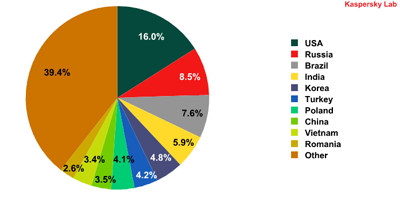Kaspersky Lab announces the publication of the analytical article 'Spam and the Law' by Darya Gudkova, Head of Content Analysis & Research. The article analyses legal methods of fighting spam.
Kaspersky Lab announces the publication of the analytical article 'Spam and the Law' by Darya Gudkova, Head of Content Analysis & Research. The article analyses legal methods of fighting spam.
"No local anti-spam law can be truly effective," says Darya Gudkova. When anti-spam laws become tighter in one country spammers just transfer their activity to other regions where the laws are not so severe or non-existent.
A prime example is the Australian Spam Act 2003, one of the most stringent pieces of legislation introduced to fight spam. It stipulates numerous requirements for senders as well as hefty fines – up to US $800,000 for each unsolicited mass mailing. Before this piece of legislation was adopted Australia had frequently been in the Top 10 sources of spam; after it came into force in 2003, it dropped so far down the list as not to appear in the Top 20 at all. Unfortunately, that does not mean there is less spam in Australia now – the spammers have just changed their location, transferring their activity to other nations.
Only pan-national legislative solutions can be truly effective and any considerable progress in fighting spam can only be achieved if each country develops corresponding legislative initiatives and judicial practice and if international cooperation in the sphere of anti-spam is established.
The first steps have already been made in this direction. The 1990s saw the introduction of anti-spam laws in many countries. The USA and the European countries initiated the process. In 2006 Russia and China joined them followed by India and Brazil in 2008. The participation of Asian, Eastern European and Latin-American countries in developing anti-spam legislation is very important because these regions are among the leading sources of spam distribution (in 2009 Russia, Brazil, India and China occupied 2nd, 3rd, 4th and 10th places respectively as the prime spam distributors).
The full version of the article ‘Spam and the Law’ can be found at www.securelist.com/en.
This material can be reproduced provided the author, company name and original source are cited. Reproduction of this material in re-written form requires the express consent of the Kaspersky Lab PR department.

